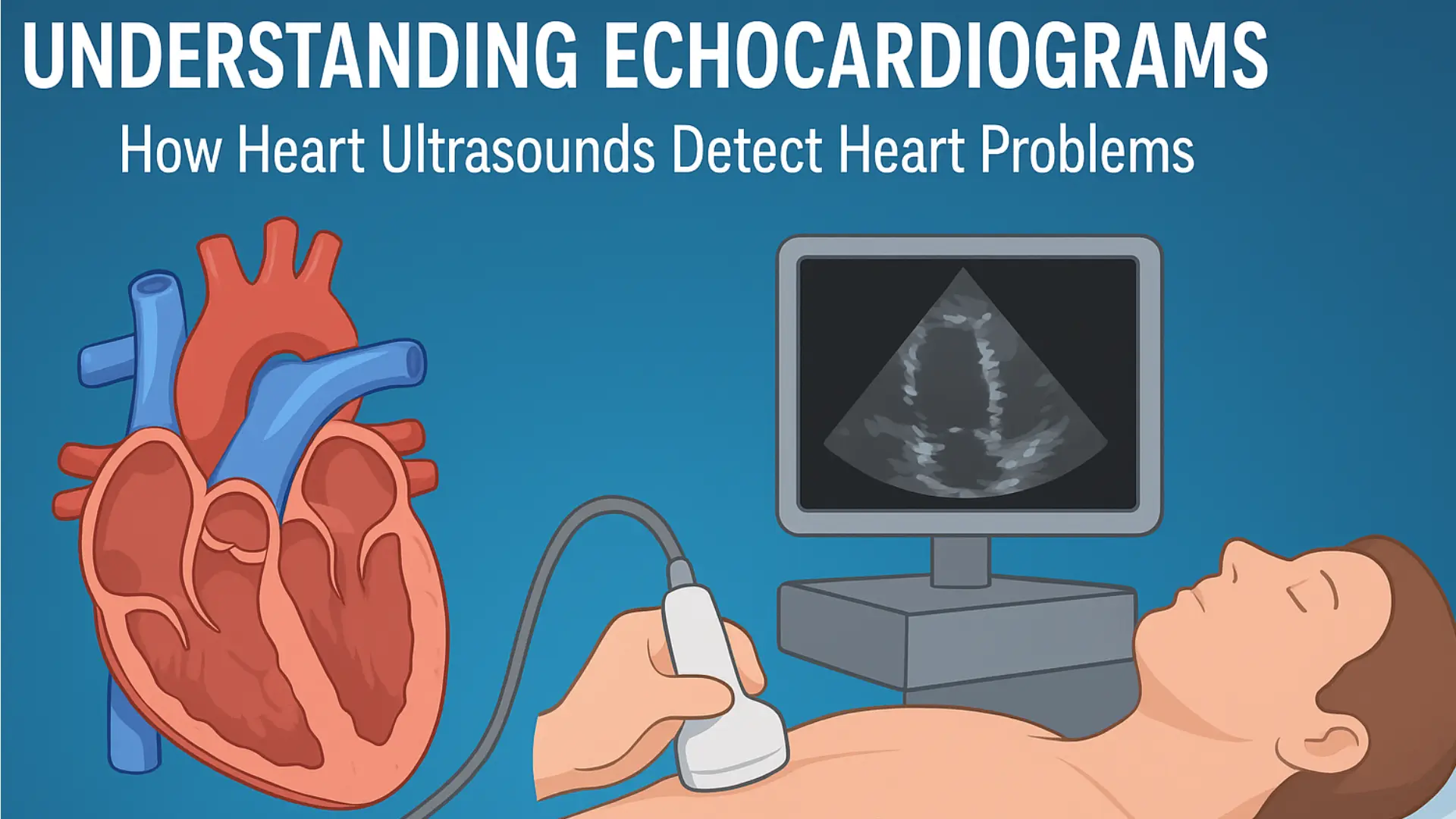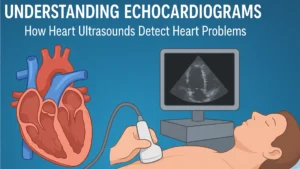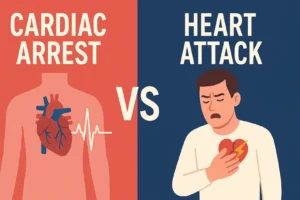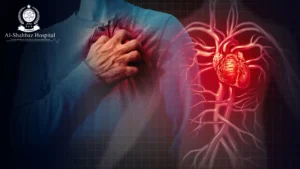Introduction
When it comes to diagnosing heart disease, early detection is crucial. Cardiovascular diseases are among the leading causes of death globally, and Pakistan is no exception. According to the World Health Organization (WHO), heart disease is responsible for approximately 30% of all deaths in Pakistan.
According to the World Health Organization (WHO), cardiovascular diseases (CVDs) are responsible for 30% of all deaths in Pakistan. That means nearly 1 in every 3 deaths in the country is due to heart-related conditions.
In the comprehensive guide, you will learn how echocardiograms detect heart problems using ultrasound technology. Explore types, procedures, benefits, risks, and Pakistani statistics.
What is an Echocardiogram?
An echocardiogram, often referred to as an “echo,” is a medical test that uses high-frequency sound waves (ultrasound) to create detailed images of the heart. It allows doctors to evaluate the heart’s structure, including the chambers, valves, and blood vessels, and monitor its function, such as how well the heart pumps blood.
How It Works
An echocardiogram works by sending sound waves through the chest to create images of the heart. These sound waves bounce off the heart structures and return to the machine, which converts them into images. The procedure is painless and non-invasive, making it an ideal method for diagnosing various heart conditions.
A gel is applied to the skin, and a transducer (a small device) is moved over the chest to capture images of the heart. The test typically lasts between 30 minutes to an hour.
Types of Echocardiograms
Transthoracic Echocardiogram (TTE)
The most common type of echocardiogram, a transthoracic echo, involves placing a transducer on the chest to capture images of the heart. It’s the first test doctors will likely use to diagnose heart problems.
Transesophageal Echocardiogram (TEE)
In some cases, a clearer view of the heart is needed. A transesophageal echocardiogram involves inserting a small camera down the throat to get closer to the heart. This is often used when the TTE does not provide enough information.
Doppler Echocardiogram
A Doppler echocardiogram is used to measure the blood flow in the heart. By assessing the direction and speed of blood flow, doctors can detect issues like valve problems, such as stenosis or regurgitation, which are common in patients with heart disease.
Why Are Echocardiograms Important for Heart Health?
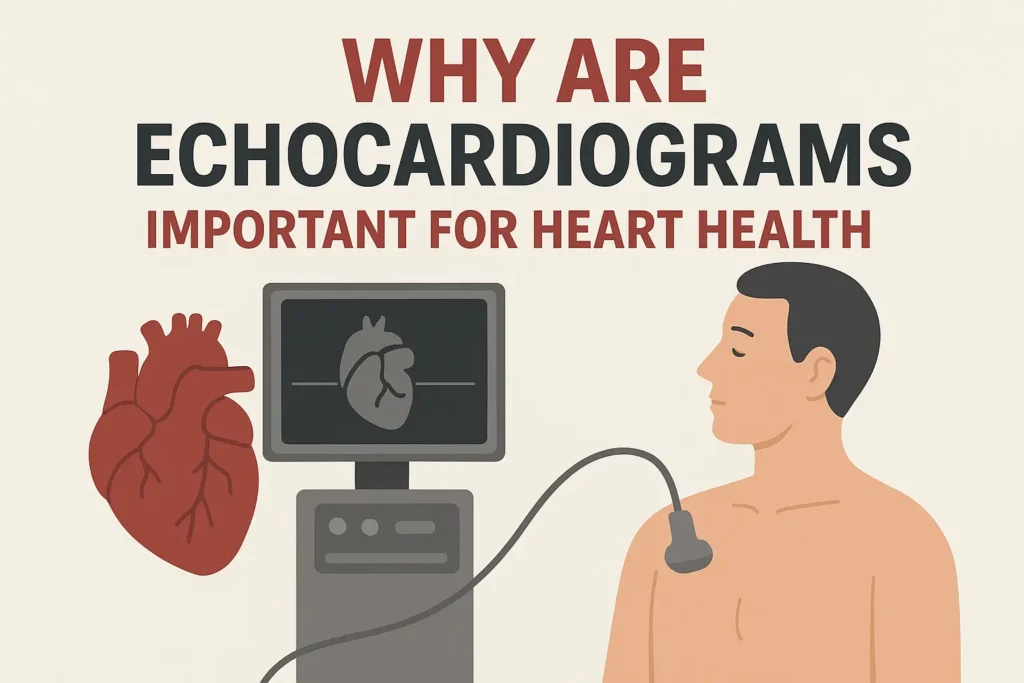
1. Detecting Common Heart Conditions
Echocardiograms are critical in diagnosing:
- Valve diseases (e.g., mitral regurgitation, aortic stenosis)
- Heart failure
- Congenital heart defects
- Pericardial effusion (fluid around the heart)
- Cardiomyopathy
(A 2023 report by the Pakistan Cardiac Society estimated that more than 40% of heart failure cases in Pakistan are diagnosed late due to a lack of imaging tools like echocardiograms in rural settings).
2. Preventive Care
Routine echocardiograms are recommended for individuals with:
- A family history of heart disease
- High blood pressure
- Obesity
- Smoking habits
- Diabates
These factors contribute significantly to premature cardiovascular deaths, especially in South Asian populations, who are genetically more prone to coronary artery disease at a younger age.
Statistical Data: Heart Disease in Pakistan
| Condition | Prevalence | Source |
| Coronary Artery Disease | 15-20% adults | Pakistan Journal of Medical Sciences, 2023 |
| Hypertension | 33% population | National Health Survey Pakistan, 2022 |
| Heart Failure | 2.8% adults | Karachi Institute of Heart Disease, 2023 |
| Rheumatic Heart Disease | 1.2% children | Pakistan Pediatric Association, 2022 |
- (Pakistan Journal of Medical Sciences)
- (National Institute of Health, Pakistan)
- (Karachi Institute of Heart Disease)
- (Pakistan Cardiac Society)
What Happens During an Echocardiogram?
| Step | Description |
| Preparation | Remove upper clothing; wear a gown; no fasting required. |
| Procedure | Gel applied; transducer moved across chest; images displayed on monitor. |
| Duration | 30 to 60 minutes |
| Post-Test | Resume normal activity immediately; results will be discussed with your cardiologist. |
The process is safe for children, elderly patients, and even pregnant women, as there’s no radiation involved.
Cost and Accessibility in Pakistan
Echocardiogram Costs Across Pakistani Cities
Average Echocardiogram Costs in Pakistan (2024)
| City | Basic Echo (PKR) | Stress Echo (PKR) | TEE (PKR) |
| Karachi | 8,000-15,000 | 18,000-25,000 | 25,000-35,000 |
| Lahore | 7,500-14,000 | 17,000-24,000 | 24,000-33,000 |
| Islamabad | 9,000-16,000 | 19,000-26,000 | 26,000-36,000 |
| Peshawar | 6,500-12,000 | 15,000-22,000 | 22,000-30,000 |
| Quetta | 6,000-11,000 | 14,000-20,000 | 20,000-28,000 |
Insurance Coverage and Government Programs
- SEHAT Sahulat Program coverage
- Private insurance policies
- Payment plans available
When You Need an Echocardiogram
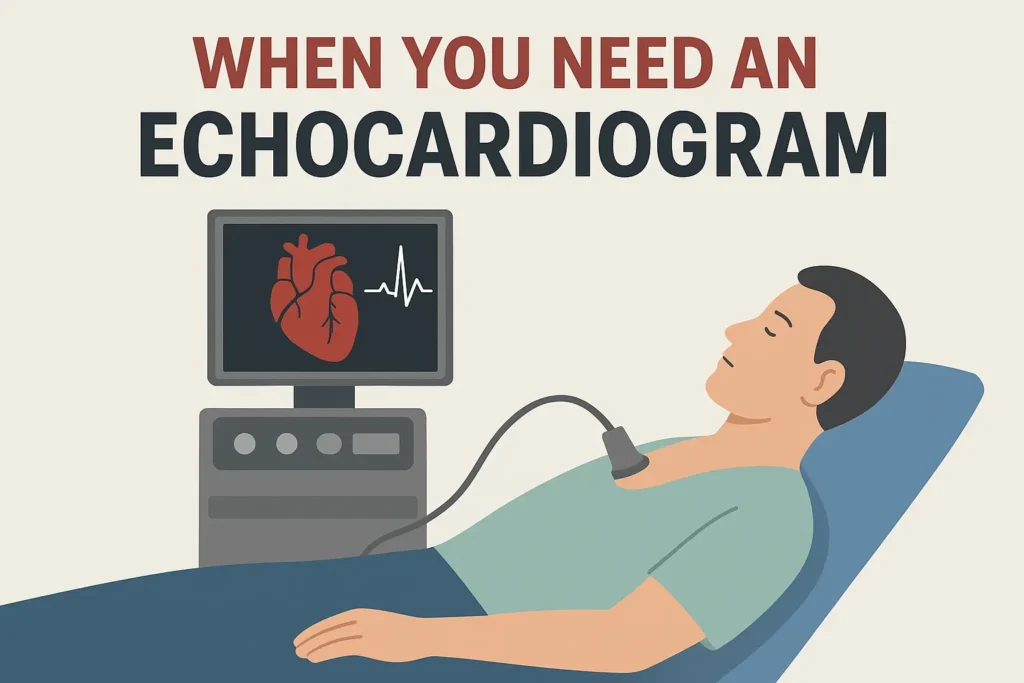
Signs and Symptoms Requiring Heart Ultrasound
Common Symptoms
- Chest pain and shortness of breath
- Heart palpitations
- Swelling in legs and feet
- Fatigue and weakness
Risk Factors Specific to the Pakistani Population
- Genetic predisposition
- Dietary factors
- Environmental considerations
Understanding Echocardiogram Results
| Parameter | Normal Range | What Abnormality Might Indicate |
| Ejection Fraction (EF) | 55–70% | Heart failure or weak heart muscle |
| Valve Function | Smooth and open | Regurgitation or stenosis |
| Chamber Size | Normal | Enlargement due to hypertension |
| Pericardial Space | No fluid | Pericardial effusion |
Your cardiologist will explain the implications of the test and may recommend further imaging or medications if abnormalities are found.
Risks and Limitations
Risks
- Minimal: Possible skin irritation from gel.
- TEE risks: Slight throat discomfort; rare allergic reactions to sedatives.
Limitations
- Cannot detect blocked coronary arteries—for that, you may need:
- CT Angiography
- Cardiac Catheterization
How Do Echocardiograms Compare to Other Heart Tests?
| Test | Purpose | Uses | Radiation |
| Echocardiogram | Structure & function | Heart chambers, valves | No |
| ECG | Electrical activity | Arrhythmias | No |
| Stress Test | Exercise tolerance | Chest pain, blockages | No |
| CT Scan | Imaging of vessels | Coronary arteries | Yes |
| MRI | Detailed imaging | Congenital heart defects | No |
According to a 2022 WHO HealthTech Report, echocardiograms remain the first-line imaging choice for heart diseases in low- to middle-income countries due to their cost-effectiveness.
Echocardiograms in Pakistan: Stats & Availability
Heart Disease in Pakistan, By the Numbers
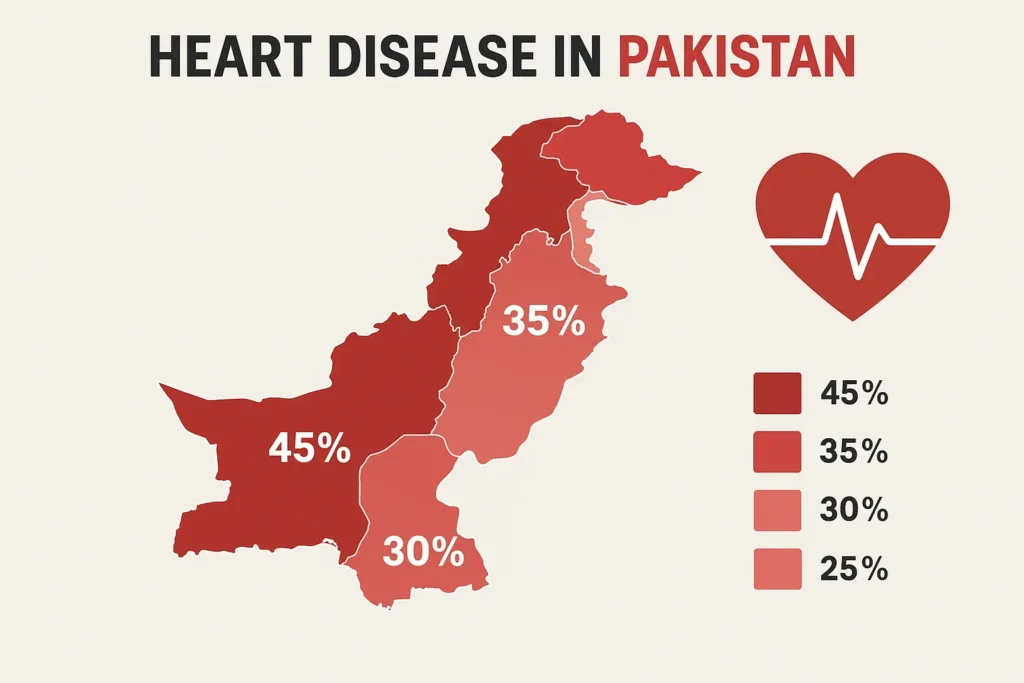
| Statistic | Value | Source |
| % of deaths from heart disease | 30% | WHO-Pakistan, 2023 |
| Adults with high blood pressure | 1 in 3 | PHA, 2022 |
| Diabetics are at risk for heart disease | 8 million+ | IDF Diabetes Atlas, 2023 |
| Cardiology hospitals with echo services | 75% (urban); <40% (rural) | Pakistan Cardiac Society Survey, 2023 |
Conclusion: Why Echocardiograms Matter for Your Heart Health
Echocardiograms are a vital, cost-effective, and non-invasive tool for monitoring and diagnosing heart health. With heart disease claiming thousands of lives annually in Pakistan, investing in preventive screening like echocardiography is not just smart—it’s lifesaving.
Whether you’re dealing with symptoms, managing a chronic condition, or just taking proactive steps for your health, getting an echocardiogram could make all the difference. Consult a cardiologist at a trusted facility like Al-Shahbaz Hospital today.
At Al-Shahbaz Hospital Kahuta, patients have access to advanced echocardiogram services performed by skilled cardiologists using the latest ultrasound technology. The hospital offers affordable diagnostics for early detection of heart conditions in both adults and children. With a commitment to cardiac care excellence, Al Shahbaz Hospital ensures timely diagnosis and personalized heart health treatment plans.
Visit Al-Shahbaz Hospital
FAQ Section
Frequently Asked Questions About Echocardiograms
How long does an echocardiogram take in Pakistani hospitals?
Typically, 30-60 minutes depending on the type and complexity of the test.
Is an echocardiogram painful?
No, it’s completely painless and non-invasive, similar to a regular ultrasound.
Do I need to fast before an echocardiogram?
Generally, no, except for stress echocardiograms, where 3-4 hours fasting may be required.
Can pregnant women have echocardiograms in Pakistan?
Yes, it’s safe during pregnancy and commonly used to monitor heart health.
How accurate are echocardiograms for detecting heart problems?
85-95% accurate for most cardiac conditions when performed by qualified technicians.
Are echocardiograms covered by Pakistani health insurance?
Most private insurance plans and the SEHAT Sahulat Program provide coverage.
How often should I get an echocardiogram?
Depends on your condition; healthy adults may need one every 3-5 years after age 40.
What’s the difference between an ECG and an echocardiogram?
ECG measures electrical activity; an echocardiogram shows heart structure and function.
Can children have echocardiograms in Pakistan?
Yes, specialized pediatric cardiac centers in major cities offer child-friendly procedures.
What should I do if my echocardiogram shows abnormalities?
Consult a qualified cardiologist immediately for proper interpretation and treatment planning.


